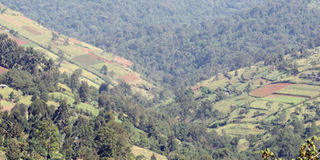African court begins hearing on Ogiek case against Kenya govt

A section of Mau Forest. "We must stop cutting down trees for selfish gain and instead adopt a healthy co-existence with our natural resources to allow us to realise our dreams," writes Emilio Mugo. PHOTO | FILE.
What you need to know:
- The hearing on the case began on Thursday at the African Court on Human and Peoples Rights (AfCHPR)’s temporary seat in Addis Ababa, Ethiopia.
- An independent intervention presented by Minority Rights Group’s International’s head of law, Ms Lucy Claridge, said that Ogiek are some of Africa's last remaining forest dwellers.
- The Kenyan government — which is represented at the public hearing by a team of three lawyers led by Ms Muthoni Kimani, the senior deputy solicitor-general — denied the Ogiek community’s allegations.
An Arusha-based African court has started hearing a case by the Ogiek community against the Kenyan government claiming consistent violations and denial of their land rights.
The hearing on the case began on Thursday at the African Court on Human and Peoples Rights (AfCHPR)’s temporary seat in Addis Ababa, Ethiopia.
The Ogiek are one of the last remaining forest-dwelling communities and one of the most marginalised indigenous peoples in Kenya.
In his opening statement, Pacifique Manirakiza, a commissioner at the African Commission on Human Rights, alleged that the Kenya government had violated the Ogiek community’s rights to life, property, natural resources, development, religion and culture.
"The Respondent State [Kenya] has for many years committed a series of acts and omissions, such as harassment and arbitrary forced evictions of the Ogiek, without consultation or compensation, from the Mau Forest, their ancestral home, where they have lived from time immemorial and which is crucial for their very survival as an indigenous people,’’ Mr Manirakiza said.
This is the first time the African Court, in operation since 2006, is hearing an indigenous peoples’ rights case.
The case was originally lodged with the African Commission and Human and Peoples' Rights, but was referred to the court on the basis that it shows serious and mass human rights violations.
SEEMINGLY POWERLESS COMMUNITY
The lead counsel for the applicant, Tom Nyanduga, stated the case is an example of a seemingly powerless community that has decided to pursue justice no matter how long it may take.
An independent intervention presented by Minority Rights Group’s International’s head of law, Ms Lucy Claridge, said that Ogiek are some of Africa's last remaining forest dwellers.
Traditionally honey-gatherers, they survive mainly on wild fruits and roots, game hunting and traditional bee-keeping.
‘’Since independence, and indeed prior to it, the Ogiek have been routinely subjected to arbitrary forced evictions from their ancestral land by the Respondent Government, without consultation or compensation,’’ she told the nine-men bench presided by the court’s president Justice Augustino Ramadhani from Tanzania.
She concluded by saying: ‘’Ogiek’s repeated and arbitrary forced eviction from their ancestral land by the Respondent Government, without their free, prior and informed consent, as well as the routine discrimination suffered by the Ogiek, their livelihoods are seriously threatened. ‘’
The Kenyan government — which is represented at the public hearing by a team of three lawyers led by Ms Muthoni Kimani, the senior deputy solicitor-general — denied the Ogiek community’s allegations.
Ms Kimani said that Kenya was eager to build a modern country and ensure that all its citizens live better lives without any discrimination.
REFER CASE BACK TO KENYA
She asked the court not to admit the case but rather refer it back to Kenya for settlement.
On the opening day on Thursday, the applicants presented two Ogiek witnesses and an expert, Dr Liz Alden Wily, an independent consultant and political economist who specialises in land tenure and natural resource governance.
The judges are expected to close the two-day hearings on Friday and set the date for the ruling.
In March last year AfCHPR issued a provisional order requiring the Kenyan government to stop land transactions in the Mau forest and refrain from taking any action, which would harm the case, until it had reached a decision.
The court, while delivering its ruling, found that if the evictions continued there was a risk of irreparable harm to the Ogiek.
Mau Forest is one of the largest indigenous forests in East Africa. The forest complex has an area of about 480,000 hectares (1,200,000 acres) and is home to an estimated 30,000 Ogiek who are the indigenous owners of the land.
The forest area experiences one of the highest rainfall rates in Kenya.





